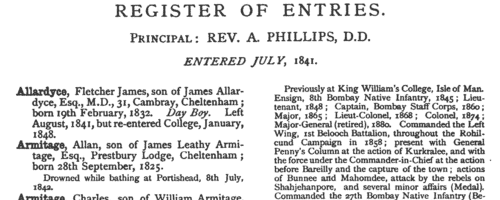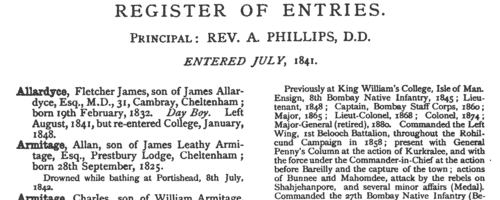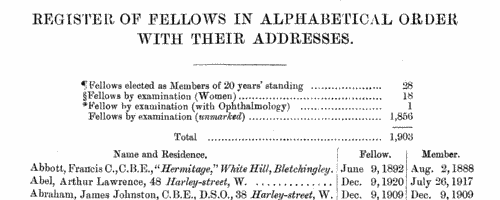Scot-skirving Surname Ancestry ResultsOur indexes 1000-1999 include entries for the spelling 'scot-skirving'. In the period you have requested, we have the following 5 records (displaying 1 to 5): Buy all | | | Get all 5 records to view, to save and print for £26.00 |
These sample scans are from the original record. You will get scans of the full pages or articles where the surname you searched for has been found. Your web browser may prevent the sample windows from opening; in this case please change your browser settings to allow pop-up windows from this site. Boys entering Cheltenham College
(1880)
Cheltenham College 'was founded in order to provide for the sons of gentlemen a Classical, Mathematical, and General Education of the highest order, on moderate terms, in strict conformity with the principles and doctrines of the Church of England.'
Andrew Alexander Hunter, the college registrar, compiled the first edition of the College Register in four parts from 1883 to 1886: these merely listed the boys by term of entry, with their dates of birth and names and addresses of their fathers. Circulars were also sent out to all Old Cheltonians whose addresses were known, requesting additional details. On the basis of the returns from these and Hunter's further researches, this much fuller register was published in 1890.
The information after each boy's name is given (where known and applicable) in this format: father's full name and address as of the time the boy entered the college; class and department on entering the college (classes being number from 1 downwards, and these again divided into A and B, some into C and D, others into P (Principal's side) and V. P. (Vice-Principal's side) - 1A was the highest class in each department: besides this, certain others were called Addiscombe, Woolwich, Civil, Direct, Line, Sandhurst, Naval, Special, Preparatory, Latin, and India Civil) and the same on leaving, name of Boarding House (or 'Day Boy'), scholastic and athletic honours attained at the college, and subsequent career (including date and place of death, or present address in 1890, if known).SCOT-SKIRVING. Cost: £4.00.  | Sample scan, click to enlarge

| Boys entering Cheltenham College
(1884)
Cheltenham College 'was founded in order to provide for the sons of gentlemen a Classical, Mathematical, and General Education of the highest order, on moderate terms, in strict conformity with the principles and doctrines of the Church of England.'
Andrew Alexander Hunter, the college registrar, compiled the first edition of the College Register in four parts from 1883 to 1886: these merely listed the boys by term of entry, with their dates of birth and names and addresses of their fathers. Circulars were also sent out to all Old Cheltonians whose addresses were known, requesting additional details. On the basis of the returns from these and Hunter's further researches, this much fuller register was published in 1890.
The information after each boy's name is given (where known and applicable) in this format: father's full name and address as of the time the boy entered the college; class and department on entering the college (classes being number from 1 downwards, and these again divided into A and B, some into C and D, others into P (Principal's side) and V. P. (Vice-Principal's side) - 1A was the highest class in each department: besides this, certain others were called Addiscombe, Woolwich, Civil, Direct, Line, Sandhurst, Naval, Special, Preparatory, Latin, and India Civil) and the same on leaving, name of Boarding House (or 'Day Boy'), scholastic and athletic honours attained at the college, and subsequent career (including date and place of death, or present address in 1890, if known).
Of course, in the case of these boys entering the school in the last few years before 1890 their career lay in the future, and the information gives relates only to their parentage and their time at school.SCOT-SKIRVING. Cost: £4.00.  | Sample scan, click to enlarge

| Classics students at Cambridge University
(1888)
Tripos lists or examination results for the year, arranged by class (First, Second and Third), and within each class in order of score in the examination (students getting exactly equal marks are bracketed together). Each student's surname and college is given: this list was printed in 1890, and was annotated with asterisks to show which students had subsequently become fellows of the university; and with footnotes showing those who had become headmasters, &c., elsewhere. The course was divided into parts I and II, with separate examinations, and the results into First Class (split into Divisions 1, 2, 3); Second Class (split into Divisions 1, 2, 3); and Third Class (split into Divisions 1, 2, 3), but the examinants listed purely alphabetically within each division. In the lists for Part II, those students gaining firsts are further annotated with the letters b, c, d or e, denoting the section or sections for which they were awarded first class honours. The letter a indicates that the candidate had also attained a first class standard in section A. An asterisk next to any of these letters indicates special distinction. Women students are listed separately, but on the same basis. These lists are particularly useful in identifying for an individual the fellow-students who will have attended lectures with him; and, where from the college, are likely to have been even more closely associated by having been under the same supervisor. (The sample scan is from the start of the Mathematics Tripos list for 1770)SCOT-SKIRVING. Cost: £6.00.  | Sample scan, click to enlarge

| Classics students at Cambridge University
(1889)
Tripos lists or examination results for the year, arranged by class (First, Second and Third), and within each class in order of score in the examination (students getting exactly equal marks are bracketed together). Each student's surname and college is given: this list was printed in 1890, and was annotated with asterisks to show which students had subsequently become fellows of the university; and with footnotes showing those who had become headmasters, &c., elsewhere. The course was divided into parts I and II, with separate examinations, and the results into First Class (split into Divisions 1, 2, 3); Second Class (split into Divisions 1, 2, 3); and Third Class (split into Divisions 1, 2, 3), but the examinants listed purely alphabetically within each division. In the lists for Part II, those students gaining firsts are further annotated with the letters b, c, d or e, denoting the section or sections for which they were awarded first class honours. The letter a indicates that the candidate had also attained a first class standard in section A. An asterisk next to any of these letters indicates special distinction. Women students are listed separately, but on the same basis. These lists are particularly useful in identifying for an individual the fellow-students who will have attended lectures with him; and, where from the college, are likely to have been even more closely associated by having been under the same supervisor. (The sample scan is from the start of the Mathematics Tripos list for 1770)SCOT-SKIRVING. Cost: £6.00.  | Sample scan, click to enlarge

| Surgeons
(1928)
The Royal College of Surgeons, established by royal charters, issued this calendar 1 August 1928, including official lists of all its fellows, members, licentiates and diplomates. The register of fellows gives full name (surname first) and address (in italics), with dates of admission as fellow and member. The list of members gives year of admission, full name (surname first) and town or country of residence. The lists of licentiates give year of admission and full name, but no indication of current address: entries of fellows of the college are prefixed with a double dagger, those of members with an asterisk. The lists of diplomates give year of admission and full name (surname first), with those diplomates who were neither members nor fellows of the college indicated with a dagger. This is the index to the members.SCOT-SKIRVING. Cost: £6.00.  | Sample scan, click to enlarge

|
Research your ancestry, family history, genealogy and one-name study by direct access to original records and archives indexed by surname.
|







